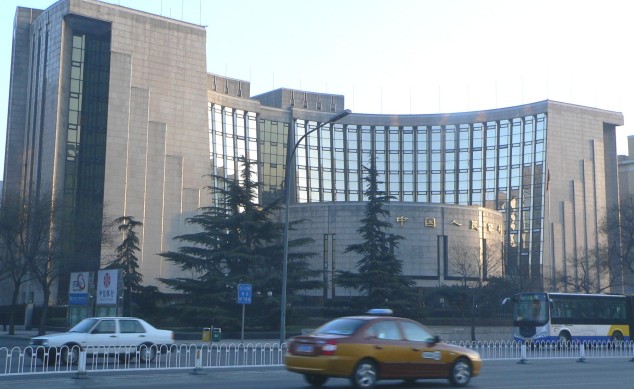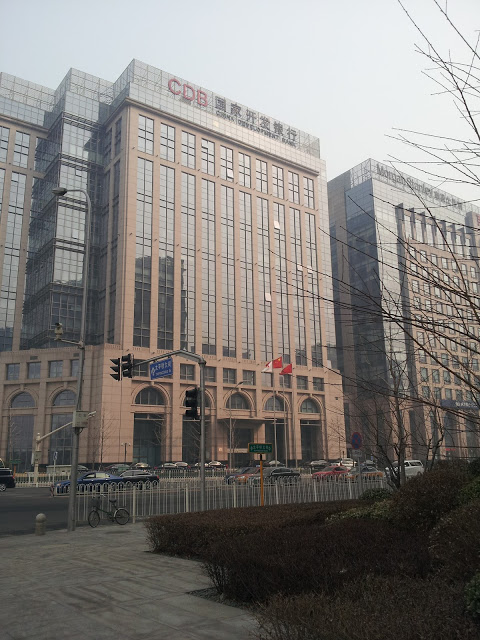I was recently asked to recommend blogs and other resources on the Chinese economy. In case other people would find it useful, I list the main ones here. Bear in mind that, not reading Chinese, I’m confined to English sources so there may be many excellent Chinese resources that I’m unaware of.
A good start for the beginner, or anyone who wants a good overview, is the World Bank report China 2030:Building a Modern, Harmonious, and Creative Society, written jointly with the Development Research Center of the State Council, People’s Republic of China. This 468 page report, downloadable free here, covers a vast range of policies that are said to be needed for China to become a rich country by 2030. It has a long section on reforms to the financial sector, which it candidly describes as repressed, unbalanced, costly to maintain and potentially unstable (pages 115-116). Among the goals are “full commercialization and rationalization of the financial system” “further liberalizing interest rates” and “deepening the capital market”. No lack of ambition here then.
A commentator I regard as well informed and sensible is Nicholas Lardy at the Peterson Institute for International Economics. Lardy is an economist, formerly at Yale University and the Brookings Institution, and a member of the Council on Foreign Relations. His book Sustaining China’s Economic Growth after the Global Financial Crisis is clear, unsensational and well written. A couple of chapters are available free here.
Lardy also writes an excellent blog called China Economic Watch. He makes regular speeches and testimonies which are available through the blog.

Another insightful commentator is Prof Michael Pettis, an American professor at the Guanghua School of Management at Peking University. His blog is here, The effect of having multiple 100Yuan notes framing the text is not to my taste, but the content is again clear and readable. Pettis is in the “pessimistic” camp on China’s near term economic growth, because he has a well thought out thesis on how successfully achieving a slowdown in credit and rebalancing of the economy towards the private sector (the government’s stated goal) will very likely lead to several years of low single digit GDP growth. Indeed slow growth would be evidence the plan is working. The counter view is that structural reform will release such a surge of productivity growth that it will allow GDP growth to remain in the high single digits. That’s possible but unlikely, in my view. Pettis is optimistic about the longer term, he’s not one of the many commentators who believe China is headed for a major crisis, though like anyone sensible he wouldn’t rule this out completely, given the scale of China’s challenges.
The other blog on Chinese finance I recommend is published by China First Capital. It has a lot of interesting detail about deals, financial gossip of a high quality and the actual path of financial reform in China, from a practitioner’s point of view.
The IMF publishes many working papers plus the annual Article IV reports on China. It’s an invaluable source of data and thoughtful analysis. The working papers are a little more frank than the official reports, being the opinions of the IMF economists, not the IMF itself. The full set of China-related material is available here. I’ve commented on several of the IMF’s reports in earlier blogs. I’d particularly commend this one and this one on local government financing in China, an opaque subject but central to understanding the mess that the government needs to get out of; and this one on the liberalisation of China’s capital account. The 2013 Article IV report is here.
Putting China in global context is essential. Stephen King, chief economist at HSBC, is good on this and writes fairly regularly for the Financial Times. An example is here. The JPMorgan economics team is one of the best in my view but their commentary is not available to the general public. Their China strategis, Jing Ulrich, writes very interesting pieces about all aspects of the Chinese economy, some of which is in the public domain.
Linda Yueh is a commentator for the BBC but has academic affiliations at Oxford and LSE. She doesn’t publish as much as before she joined the BBC unfortunately but there is a podcast of her talking about her book China’s Growth: The Making of an Economic Superpower, which I recommend (I listen to LSE podcasts while doing the ironing, which makes a dreary task productive). There is a review here.
Victor Shih is a distinguished academic at Northwestern University, and a member of the Institute for New Economic Thinking (a rich source of information on many subjects by the way). He’s a political scientist rather than economist. His 2008 book Factions and Finance in China: Elite Conflict and Inflation is a fascinating and scholarly (in the best sense) analysis of political factions and financial policy in China. It’s more detailed than most people might need but if you want a more profound understanding of how policy works in China this is worth looking at. He has an interesting and persuasive video on the danger of capital leaving China in a great rush when the controls are relaxed, posing a risk to the real estate sector.

Lastly, I recommend two readable books on the big subject of China’s rise and potential threat to the US and the world order. The first explains calmly but with relentless force the many problems facing the Chinese government, Timothy Beardson‘s Stumbling Giant: The Threats to China’s Future. Beardson is an investment banker with considerable Far East experience and his book is very detailed, well argued and convincing, with a fascinating summary of China’s historic context. Here is a short, positive review in the South China Morning Post. Beardson is not one of the alarmists expecting catastrophe in China but his book is a good counterpoint to the more optimistic, but also well argued, Eclipse: Living in the Shadow of China’s Economic Dominance by Peterson Institute fellow Armind Subramanian. Part of the book is available free here. An interesting review that takes in the wider debate about China’s rise is here.
UPDATE
Another very useful blog I’ve come across is by Chris Balding, an American professor at Peking University’s graduate school in Shenzhen.
FURTHER UPDATE
Unfortunately Chris Balding has discontinued his blog having left China. Two newsletters I recommend, which cover China generally, not just economics and finance are:
https://www.axios.com/newsletters/axios-china
https://supchina.com/category/newsletter/
A more recent book that is pessimistic about China’s economic situation is George Magnus’ Red Flags, which gives a comprehensive view of the debt and demographic challenges facing China.


Benito Vera
Thanks for this, Simon
Very useful to dip my toes in this fascinating emerging power
Quite interested in how to make business connections with China
john kelly
Thanks Simon – don’t what we’d do without you !